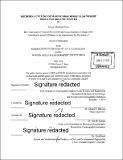Microbial cycling of marine high molecular weight dissolved organic matter
Author(s)
Sosa, Oscar Abraham
DownloadFull printable version (19.15Mb)
Other Contributors
Massachusetts Institute of Technology. Department of Civil and Environmental Engineering.
Advisor
Edward F. DeLong.
Terms of use
Metadata
Show full item recordAbstract
Microorganisms play a central role mediating biogeochemical cycles in the ocean. Marine dissolved organic matter (DOM) - a reservoir of organic solutes and colloids derived from plankton is a major source of carbon, nutrients, and energy to microbial communities. The biological transformation and remineralization of DOM sustains marine productivity by linking the microbial food web to higher trophic levels (the microbial loop) and exerts important controls over the cycles of carbon and bioessential elements, such as nitrogen and phosphorus, in the sea. Yet insight into the underlying metabolism and reactions driving the degradation of DOM is limited partly because its exact molecular composition is difficult to constrain and appropriate microbial model systems known to decompose marine DOM are lacking. This thesis identifies marine microorganisms that can serve as model systems to study the metabolic pathways and biochemical reactions that control an important ecosystem function, DOM turnover. To accomplish this goal, bacterial isolates were obtained by enriching seawater in dilution-to-extinction culturing experiments with a natural source of DOM, specifically, the high molecular weight (HMW) fraction (>1 kDa nominal molecular weight) obtained by ultrafiltration. Because it is relatively easy to concentrate and it is fairly uniform in its chemical composition across the global ocean and other aquatic environments, HMW DOM has the potential to serve as a model growth substrate to study the biological breakdown of DOM. The phylogeny, genomes, and growth characteristics of the organisms identified through this work indicate that HMW DOM contains bioavailable substrates that may support widespread microbial populations in coastal and open-ocean environments. The availability of ecologically relevant isolates in culture can now serve to test hypothesis emerging from cultivation-independent studies pertaining the potential role of microbial groups in the decomposition of organic matter in the sea. Detailed studies of the biochemical changes exerted on DOM by selected bacterial strains will provide new insight into the processes driving the aerobic microbial food chain in the upper ocean.
Description
Thesis: Ph. D., Joint Program in Oceanography/Applied Ocean Science and Engineering (Massachusetts Institute of Technology, Department of Civil and Environmental Engineering; and the Woods Hole Oceanographic Institution), 2015. Cataloged from PDF version of thesis. Includes bibliographical references.
Date issued
2015Department
Joint Program in Oceanography/Applied Ocean Science and Engineering; Woods Hole Oceanographic Institution; Massachusetts Institute of Technology. Department of Civil and Environmental EngineeringPublisher
Massachusetts Institute of Technology
Keywords
Joint Program in Oceanography/Applied Ocean Science and Engineering., Woods Hole Oceanographic Institution., Civil and Environmental Engineering.